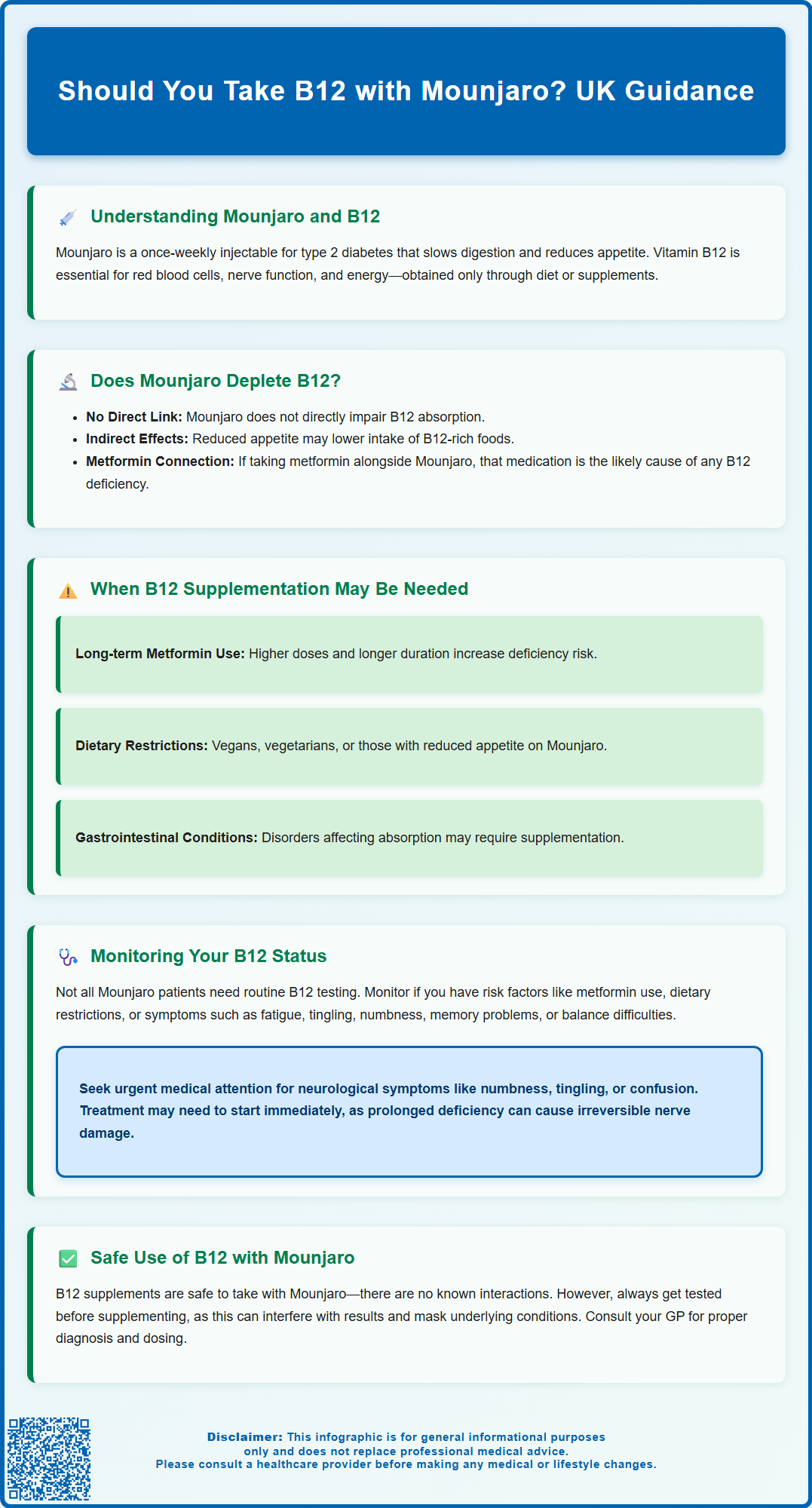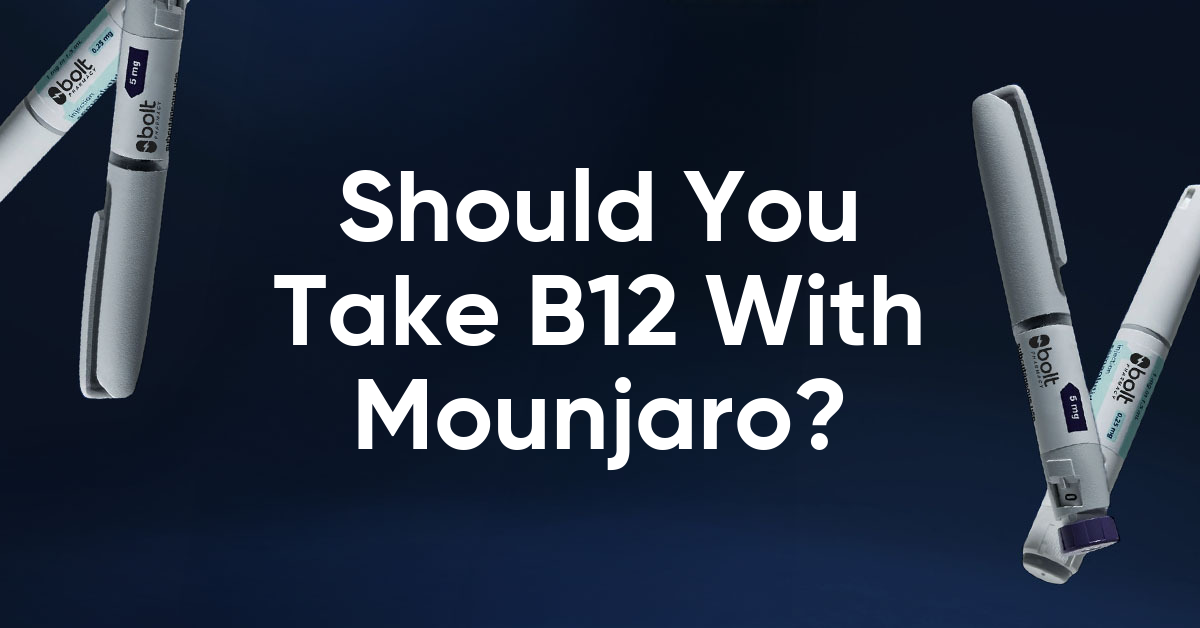Mounjaro (tirzepatide) is a dual GIP/GLP-1 receptor agonist licensed in the UK for type 2 diabetes management. As patients begin treatment, questions often arise about whether you should take B12 with Mounjaro and how this medication affects nutritional status. Whilst Mounjaro does not directly deplete vitamin B12 levels, understanding the relationship between tirzepatide therapy and B12 status is important—particularly for those on concurrent metformin, following restricted diets, or with pre-existing gastrointestinal conditions. This article examines the evidence, identifies who may benefit from supplementation, and provides practical guidance on monitoring and safe use of B12 alongside Mounjaro treatment.
Summary: Mounjaro (tirzepatide) does not directly deplete vitamin B12, and routine supplementation is not required unless specific risk factors are present.
- Mounjaro is a dual GIP/GLP-1 receptor agonist licensed in the UK for type 2 diabetes, with no evidence of direct B12 depletion.
- Concurrent metformin use, restrictive diets, gastrointestinal disorders, and older age increase B12 deficiency risk independently of Mounjaro.
- Serum B12 testing is recommended for at-risk patients; neurological symptoms require urgent medical assessment and may need immediate intramuscular treatment.
- Oral B12 supplementation (50–150 micrograms daily) is safe with Mounjaro, though testing before supplementation is advised to identify underlying causes.
- The MHRA does not list B12 deficiency as a recognised adverse effect of tirzepatide; any deficiency in combination therapy may relate to metformin rather than Mounjaro.
Table of Contents
Understanding Mounjaro and Vitamin B12
Mounjaro (tirzepatide) is a once-weekly injectable medication licensed in the UK for the treatment of type 2 diabetes mellitus. It belongs to a novel class of medicines known as dual glucose-dependent insulinotropic polypeptide (GIP) and glucagon-like peptide-1 (GLP-1) receptor agonists. By mimicking the action of these naturally occurring incretin hormones, Mounjaro enhances insulin secretion in response to meals, suppresses glucagon release, slows gastric emptying, and reduces appetite—collectively leading to improved glycaemic control and weight loss.
Vitamin B12 (cobalamin) is an essential water-soluble vitamin that plays a critical role in red blood cell formation, neurological function, DNA synthesis, and energy metabolism. The body cannot produce B12, so it must be obtained through dietary sources such as meat, fish, dairy products, and fortified foods, or via supplementation. Absorption of B12 occurs primarily in the terminal ileum and requires intrinsic factor, a protein secreted by gastric parietal cells, as well as adequate stomach acid.
Given that Mounjaro affects gastrointestinal function—particularly by slowing gastric emptying—patients and healthcare professionals have raised questions about whether this medication might affect nutrient intake or absorption. While there is no evidence that Mounjaro directly impairs B12 absorption, understanding the relationship between Mounjaro and B12 status is important for ensuring optimal nutritional health during treatment, particularly for individuals on long-term therapy or those with pre-existing risk factors for deficiency.

Does Mounjaro Deplete Vitamin B12 Levels?
Currently, there is no evidence that Mounjaro (tirzepatide) depletes vitamin B12 levels. The Medicines and Healthcare products Regulatory Agency (MHRA) product information for Mounjaro does not list vitamin B12 deficiency as a recognised adverse effect. Unlike metformin—a commonly prescribed diabetes medication associated with reduced B12 levels in some patients—tirzepatide has not been shown to interfere with B12 absorption.
However, it is important to consider the indirect effects of Mounjaro on nutritional status. The medication's ability to slow gastric emptying and reduce appetite can lead to decreased overall food intake. If dietary intake becomes substantially restricted—especially of animal-based products rich in B12—there is a theoretical risk of developing lower B12 levels over time, though this would be related to reduced consumption rather than impaired absorption.
Additionally, patients with type 2 diabetes are often prescribed metformin alongside Mounjaro. The MHRA has issued a Drug Safety Update highlighting that metformin can reduce vitamin B12 levels, with the risk increasing with higher doses and longer duration of treatment. The exact mechanism is not fully understood. For individuals on combination therapy, any B12 deficiency may be related to metformin rather than tirzepatide itself. It is therefore essential to distinguish between the effects of Mounjaro and those of concurrent medications when assessing B12 status.
When B12 Supplementation May Be Necessary
While Mounjaro itself does not directly cause B12 deficiency, certain patient groups may benefit from B12 supplementation or closer monitoring. Individuals at higher risk include those with:
-
Long-term metformin use: Patients taking metformin for several years, particularly at higher doses, have an increased likelihood of developing B12 deficiency. The MHRA advises that patients on metformin should be monitored for B12 deficiency if they develop symptoms such as anaemia or neuropathy.
-
Restrictive dietary patterns: Those following vegan or vegetarian diets, or individuals experiencing significant appetite suppression and reduced food intake on Mounjaro, may not consume adequate dietary B12.
-
Gastrointestinal conditions: Pre-existing conditions such as pernicious anaemia, Crohn's disease, coeliac disease, or previous gastric surgery can impair B12 absorption independently of medication use.
-
Older adults: Age-related decline in stomach acid production (achlorhydria) reduces the release of B12 from food, making older patients more susceptible to deficiency.
If deficiency is confirmed, treatment depends on the cause. For dietary insufficiency, oral B12 supplementation (typically cyanocobalamin 50–150 micrograms daily) is usually sufficient. For deficiency due to malabsorption or pernicious anaemia, intramuscular hydroxocobalamin injections are the first-line treatment in the UK, following standard NHS protocols.
When B12 deficiency is diagnosed, further investigation to determine the underlying cause may be necessary, including testing for anti-intrinsic factor antibodies or coeliac disease screening where appropriate. Patients should discuss supplementation with their GP or diabetes specialist rather than self-prescribing, to ensure appropriate diagnosis, dosing and monitoring.
How to Monitor Your B12 Status on Mounjaro
Monitoring of vitamin B12 status should be considered for patients on Mounjaro who have risk factors for deficiency, rather than routinely for everyone. Testing is particularly important for those with a history of metformin use, gastrointestinal disorders, dietary restrictions, or symptoms suggestive of deficiency.
The serum B12 test is the most commonly used initial screening tool. Your laboratory will provide specific reference ranges for interpretation, as these can vary between different testing methods. Some UK laboratories now use holotranscobalamin (active B12) as a more sensitive marker of B12 status. In selected cases, additional tests may be considered:
-
Methylmalonic acid (MMA): Elevated levels suggest functional B12 deficiency, though interpretation requires caution in patients with kidney disease.
-
Homocysteine: Raised homocysteine can indicate B12 or folate deficiency, though it is less specific than MMA.
-
Full blood count (FBC): Macrocytic anaemia (elevated mean cell volume) may be a sign of B12 deficiency, though not all deficient patients develop anaemia.
Patients should be alert to symptoms of B12 deficiency, which can develop gradually and include persistent fatigue, weakness, pale skin, shortness of breath, tingling or numbness in the hands and feet (paraesthesia), difficulty walking, memory problems, and mood changes.
If you develop neurological symptoms such as numbness, tingling, balance problems, confusion or memory issues while taking Mounjaro, seek urgent medical attention. These symptoms require prompt assessment and may need immediate treatment with intramuscular B12 injections—treatment should not be delayed while waiting for test results, as neurological damage can become irreversible if deficiency is prolonged. For non-urgent symptoms, contact your GP for assessment and appropriate testing.
Safe Use of B12 Supplements with Mounjaro
Vitamin B12 supplementation is generally safe and well-tolerated, with no known adverse interactions with Mounjaro (tirzepatide). According to the Mounjaro Summary of Product Characteristics, tirzepatide is not expected to affect vitamin absorption. B12 is a water-soluble vitamin, meaning that excess amounts are typically excreted in urine rather than accumulating to toxic levels.
For most individuals with dietary insufficiency, oral B12 supplements in the form of cyanocobalamin at doses of 50–150 micrograms daily are sufficient to maintain adequate levels. Higher doses may be recommended in specific circumstances under clinical supervision. For confirmed B12 deficiency due to malabsorption or pernicious anaemia, intramuscular hydroxocobalamin is the standard UK treatment.
While B12 supplements are generally safe, they can occasionally cause side effects such as injection-site reactions with the intramuscular form, or rarely, allergic reactions. If you experience any suspected adverse effects from B12 supplements or from Mounjaro, report them through the MHRA Yellow Card Scheme (yellowcard.mhra.gov.uk or via the Yellow Card app).
Key safety advice includes:
-
If you suspect B12 deficiency, get tested before starting supplements, as supplementation can affect test results and mask underlying conditions.
-
Always discuss supplementation with your healthcare provider before starting, particularly if you have other medical conditions.
-
Follow recommended dosing instructions and avoid very high doses unless specifically advised by your doctor.
-
Continue regular monitoring as recommended by your clinician.
-
Report any new or worsening symptoms promptly, even if you are taking supplements.
In summary, while Mounjaro does not directly deplete vitamin B12, maintaining awareness of your nutritional status and working collaboratively with your healthcare team ensures safe and effective long-term treatment. If you have concerns about B12 or any aspect of your medication, your GP or diabetes specialist is the best source of personalised advice and support.
Frequently Asked Questions
Does Mounjaro cause vitamin B12 deficiency?
No, there is no evidence that Mounjaro (tirzepatide) directly causes vitamin B12 deficiency. The MHRA does not list B12 deficiency as a recognised adverse effect of tirzepatide, unlike metformin which is associated with reduced B12 levels in some patients.
Who should consider B12 supplementation whilst taking Mounjaro?
Patients at higher risk include those on long-term metformin, following vegan or restrictive diets, with gastrointestinal conditions affecting absorption (such as pernicious anaemia or coeliac disease), or older adults with reduced stomach acid production. Discuss supplementation with your GP or diabetes specialist before starting.
Is it safe to take vitamin B12 supplements with Mounjaro?
Yes, vitamin B12 supplementation is generally safe and well-tolerated with Mounjaro, with no known adverse interactions. B12 is water-soluble, so excess amounts are typically excreted rather than accumulating to harmful levels.
The health-related content published on this site is based on credible scientific sources and is periodically reviewed to ensure accuracy and relevance. Although we aim to reflect the most current medical knowledge, the material is meant for general education and awareness only.
The information on this site is not a substitute for professional medical advice. For any health concerns, please speak with a qualified medical professional. By using this information, you acknowledge responsibility for any decisions made and understand we are not liable for any consequences that may result.
Heading 1
Heading 2
Heading 3
Heading 4
Heading 5
Heading 6
Lorem ipsum dolor sit amet, consectetur adipiscing elit, sed do eiusmod tempor incididunt ut labore et dolore magna aliqua. Ut enim ad minim veniam, quis nostrud exercitation ullamco laboris nisi ut aliquip ex ea commodo consequat. Duis aute irure dolor in reprehenderit in voluptate velit esse cillum dolore eu fugiat nulla pariatur.
Block quote
Ordered list
- Item 1
- Item 2
- Item 3
Unordered list
- Item A
- Item B
- Item C
Bold text
Emphasis
Superscript
Subscript










